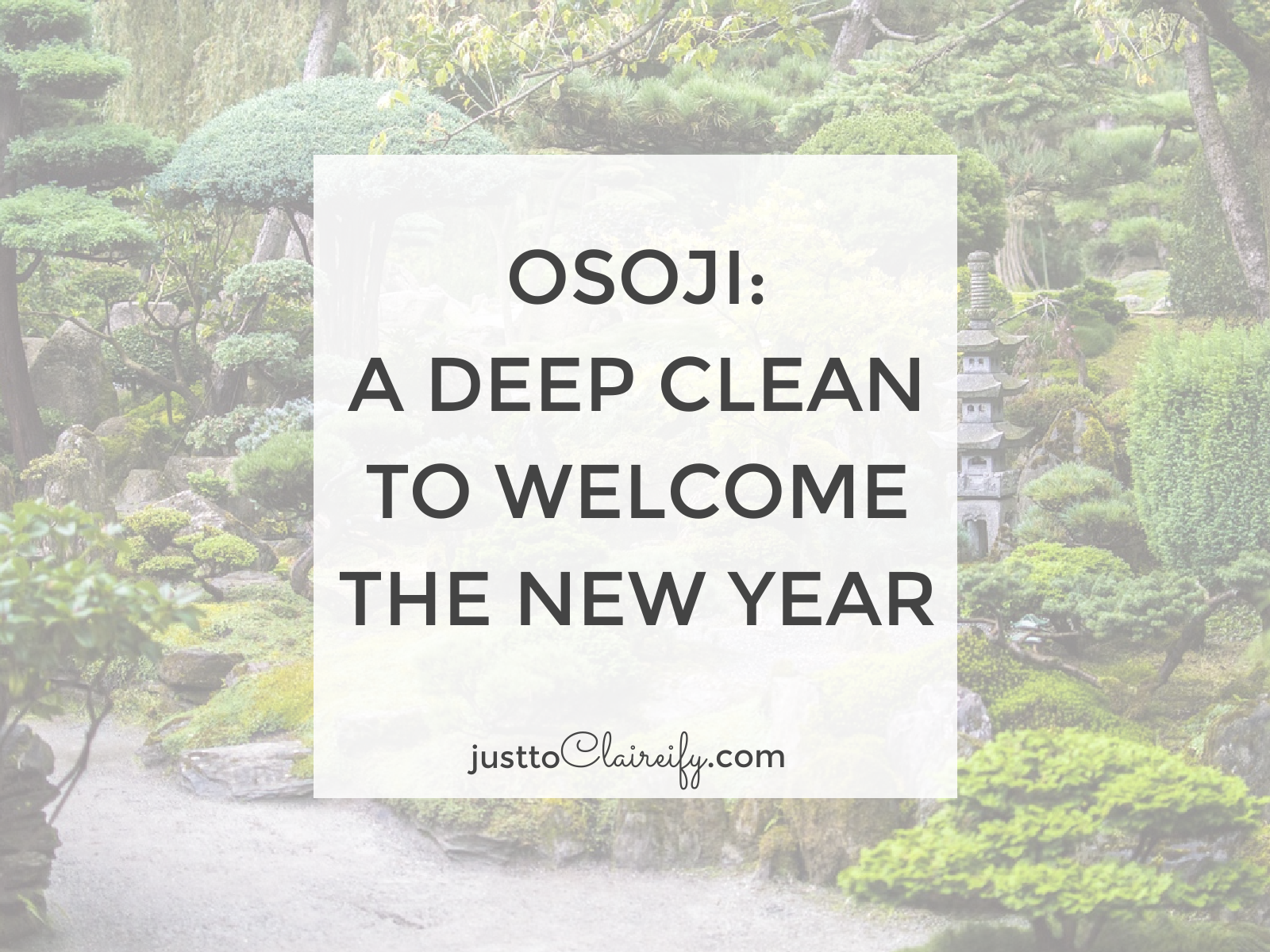 Last month, in the midst of my own major post-holiday declutter, I learned a new-to-me term: osoji, which Google tells me literally means “big clean” in Japanese. It’s not a new tradition at all, however–it dates back to circa 800 A.D. At that time, the Imperial Court was ritually cleansed of soot at the end of each year to welcome the deity of the new year (source, source).
Last month, in the midst of my own major post-holiday declutter, I learned a new-to-me term: osoji, which Google tells me literally means “big clean” in Japanese. It’s not a new tradition at all, however–it dates back to circa 800 A.D. At that time, the Imperial Court was ritually cleansed of soot at the end of each year to welcome the deity of the new year (source, source).
Keeping my home free from unused items does have a spiritual component for me. It feels respectful to my family to maintain a decluttered home in which the kids can play and Eric and I can efficiently live our lives. It feels respectful to the environment to thoughtfully pass on items we don’t need, and to receive an annual reminder to be intentional about the things we bring into our home. I even have more mental space to focus on what matters in life and to be intentional about my own spiritual practice when we aren’t overwhelmed by unnecessary stuff.
How Does One Do Osoji?
The first step is a whole-house declutter. Decluttering involves not just parting with obvious junk, but also parting with items you purchased for a past self. This can be a surprisingly emotional process. We need to shed old layers to make room for our best future selves, but it can be difficult even knowing this.
You can trash the clutter, drop it off at a charity store or try to intentionally rehome it. During the year I try to give things a new home via our local Buy Nothing page. But we made a big trip to Goodwill after our December cleanout. With some things (like expired medications or broken plastic toys) the only option is the garbage.
Seeing our overflowing trash bin during a decluttering spree is a sobering reminder to me to limit the amount of items that enter our home. Unfortunately, whether we like it or not, the majority of synthetic material will end up in a landfill someday. This reminds me the importance of buying natural fibers, food in less/no packaging, and wood or fabric toys that will one day biodegrade.
The next step is to organize what remains. Importantly, organizing happens after the declutter. Organized clutter is still clutter!
The last step is a thorough deep cleaning of the house. Not just the usual sweep and mop, but cleaning the inside of cupboards, under sofas and washing textiles like curtains and furniture. We are fortunate to have an every-other-week cleaning service to help us with the basics. I’ve also been putting myself to work wiping out cabinets and bins as I declutter. It’s a lot of work to keep even our small space relatively clean. So don’t think it happens all at once over here with small children underfoot.
Benefits of Osoji
- The entire family contributes. As they should! Not only is decluttering and deep cleaning an entire house a significant amount of work–but everyone should have input on what stays or goes. I will say that my kids are surprisingly less attached to many material items than I am. My oldest was a huge help recently while decluttering our board games and children’s books. He put many items in the donation bags that I would have kept.
- Osoji happens regularly–every year. Decluttering isn’t usually a task that ends up in a cleaning routine. But it’s important to do it regularly so you don’t accumulate an overwhelming amount of superfluous stuff. Likewise, cleaning out drawers or under sofas often doesn’t happen regularly either, but certainly should!
- Marking a fresh start. I have mixed feelings on New Years resolutions. If there’s something I want to work on–like working out or a new writing habit–I’m likely to start right away. I don’t like putting off the work until an arbitrary date. On the other hand, I do like sitting down and thinking about my big priorities for each new year–like expanding our garden or an ambitious financial goal that will take months to reach. Gearing up for a new year by reducing the amount of visual clutter and stuff to care for in my home feels appropriate in that way. I want to start off strong by focusing on my goals, not working around piles of clutter.
- Reflecting on higher values. As a spiritual practice, osoji is not only about cleaning your space but also your mind. For me, seeing the massive amount of stuff I’m about to give away–especially after the holidays–actually makes me feel a bit sick. This is good, because it reminds me that there is much improvement to be made towards our sustainability goals. I don’t struggle to part with items, but sometimes I bring too much stuff into our home. And often I am bad at drawing boundaries with others. I take in their clutter or don’t express my anticonsumerist sentiments during gifting holidays.
Did you know about osoji? Do you deep clean your home on a regular basis?
xx Claire


